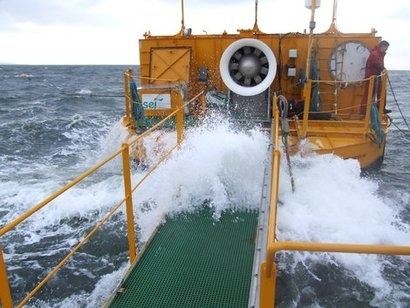
The plan is to reduce risk at the design phase and aid design optimisation. Improved reliability will increase energy output and drive down the cost of marine energy.
At present, tidal turbines suffer similar operational issues to wind turbines, but the costs of retrieving and reinstalling a tidal turbine, and the loss of income from power generation, can be significant, driving up operation and maintenance costs and therefore also the total cost of marine energy.
The project, which includes partners Ricardo and DNV GL, will address the unique reliability issues faced by a tidal turbine powertrain in converting energy to electricity. The research will be conducted using the existing turbine testing capability at ORE Catapult’s 3MW Drive Train facility in Blyth, Northumberland. It will identify existing data on tidal turbine reliability and any data gaps, and define a process and simulation methodology to better predict degradation or potential failure, as well as the reliability of a tidal turbine. It will also gather data through planned live testing, and develop a range of tools which can be employed at the design stage as well producing a recommended best practice guide on design optimisation.
These measures will help to increase confidence in tidal technology. Other leading tidal turbine developers and universities have also offered their support to further developing the project which will draw on reliability data and generic lessons learnt and from many industries including offshore wind, oil and gas, defence, automotive and rail.
Research into tidal turbine reliability has been segmented thus far. It has also been product specific, lacking a systematic and industry wide approach. Fully understanding the key areas of reliability can help developers to further optimise systems, thereby helping to bring down the cost.
“Improving the reliability of tidal turbine powertrains, and being able to more accurately predict failure rates at the design stage, will significantly increase investor confidence in tidal turbine technology and will ultimately reduce the cost of tidal energy to the consumer” said ORE Catapult Marine Sector Specialist Simon Cheeseman. “This project allows ORE Catapult to further develop our knowledge and expertise with regards to tidal turbine reliability issues, and offer an enhanced service from our existing tidal turbine test facility, offering value-added services that are highly attractive to industry.”
Ricardo’s global market sector head for clean energy and power generation, Paul Jordan, added that the company will apply its extensive experience in renewable energy to the development processes of tidal powertrain systems and components. Understanding the key factors behind reliability and the lessons learnt from more established industries such as automotive, defence and wind energy, will allow Ricardo to establish a robust ‘Design for Reliability’ methodology for tidal powertrains as well as identifying areas for design optimisation and further cost of energy reduction.
For additional information:

